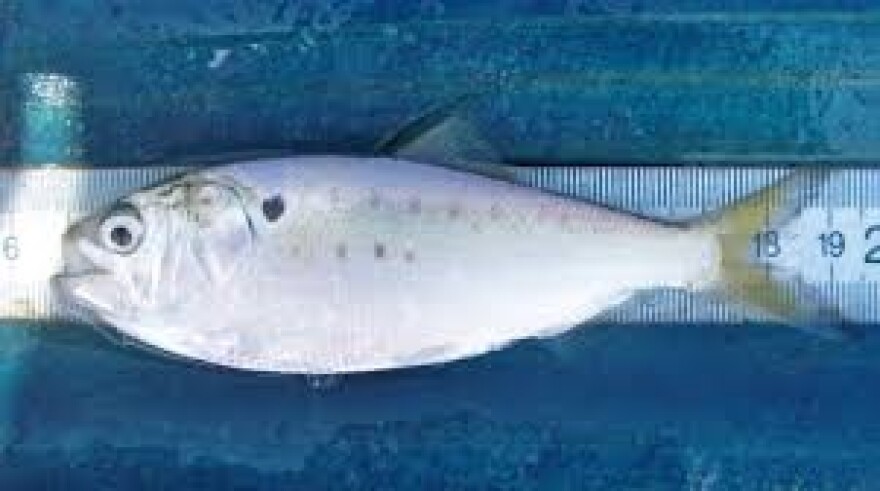Virginia’s legislature is back in session, and that means lawmakers will again be talking about a tiny fish called the menhaden. It’s the only fish regulated by lawmakers rather than scientists, and proposed catch limits are again proving controversial.
Menhaden are small, oily fish that can live 8 years and grow to a pound or more.
“Most of the ones people see in the Bay thought are what we call peanut-bunker,” says Chris Moore, a senior scientist with the Chesapeake Bay Foundation.
“Those are up to about a year old They are couple of inches long and they swim in very large schools near the surface and they can actually be spotted by airplane.”
In fact, aerial spotters guide ships owned by Omega Protein, which employs more than 250 people in the Northern Neck, catching and processing menhaden for fish oil supplements, fertilizer, farm animal and pet food. Omega was not happy when a regional regulator – the Atlantic States Marine Fisheries Commission – said every state but Virginia could increase its menhaden catch by half a percent, but the Bay harvest should be cut.
“The menhaden/Chesapeake Bay reduction cap only applies to Omega Protein," says Omega spokesman Ben Landry. "That quota was reduced by 41% Fisheries management should be applied fairly – not let’s pick on the big guy. To say, ‘The stock is healthy. Everyone else gets to increase, but Omega you don’t.' That’s just fundamentally unfair!”
A coast-wide assessment of menhaden in 2017 concluded stocks were healthy, but environmentalists say the Bay is a nursery for menhaden and should have special protection. Omega argues small fish are now found in two other places.
“Basically 70% of all menhaden used to be in those first years of life in the Chesapeake Bay. Now it’s roughly about 30,” Landry says.
Scientists argue we have to leave enough of these nutritious fish to sustain wildlife – marine mammals, sea birds and bigger fish, and Chris Moore points out that Omega takes the biggest share of the catch.
“We have about 70% of the entire coast-wide catch that’s landed in the Commonwealth, and about 90% is landed by Omega Protein.”
Spokesman Ben Landry says Omega’s fleet would be idled if it’s too rough to fish in the ocean.
“Those years where you’ve got numbered of named storms and you can’t fish out in the ocean, but you can fish in the Bay you’d have to tie up your boats on those days," he explains. "We’ve got 250-300 employees there in Reedville that are dependent on that. We’re vilified an awful lot, but these employees are hard-working, and listen we’re the good guys here.”
He’s in Richmond now, lobbying lawmakers not to adopt the Bay cap – a case he made successfully last year. Critics note that Omega has given $450,000 in campaign contributions over the past decade. Landry dismisses that charge nothing, "There’s a number of entities that contribute far more than we do that are regulated by the same body. We participate in the political process just like anyone else.”
Environmentalists are making their case to the legislature, and they’re asking an international group that certifies sustainable fisheries not to give its seal of approval to Omega.
“The Marine Stewardship Council is a European-based organization that certifies fisheries as being sustainable," says the Cheapeake Bay Foundation's Chris Moore. "One of the principles of the MSC process is an effective management plan that respects local, national, international laws and things like that, and at this time Omega Protein is not in compliance with the coast-wide management plan due to their own lobby efforts.”
The public has a chance to comment on that situation until January 14th, and the Atlantic States Marine Fisheries Commission says it will study scientific assessments of the menhaden population using various models and come up with new regulations in 2020.
You can weigh-in by contacting Omega: hq@omegaprotein.com




